
Afterword

A persistent Utah myth holds that some of the murderers of Joseph and Hyrum Smith met fittingly gruesome deathsthat Providence intervened to dispense the justice denied in the Carthage trial. But the five defendants who went to trial, including men who had been shown to be leaders in the murder plot and others associated with them, enjoyed notably successful careers.
After losing his election for sheriff in Hancock County in 1846, Mark Aldrich left Illinois for California during the Gold Rush. By the 1860's he had settled in Tucson, Arizona, where he served as postmaster and was elected to three terms in the upper house of the territorial legislature, acting during the 1866 term as its president. He died in Tucson in 1874 at the age of seventy-three.
Jacob C. Davis distinguished himself as one of Hancock's most successful politicians. He was reelected to the state senate in 1846, 1850, and 1854, making four successive terms. In 1856 he was elected to Congress, filling a vacancy created by the resignation of William A. Richardson, but he was defeated in his bid for reelection.
William N. Grover ran last among four candidates for state representative from Hancock County in 1852; afterward he moved to St. Louis, where he practiced law. In 1863 he was appointed U.S. attorney for the eastern district of Missouri. He moved back to Warsaw prior to 1871 and was still living there in 1890, prosperous and respected.
His political objectives toward the Mormons attained, Thomas Sharp gave up the Warsaw Signal in 1846. Thereafter he became an educator, lawyer, judge, and, again, a newspaperman. He was elected delegate to the state constitutional convention in 1847, was
Levi Williams, psychologically a more violent man than the others, was active in raiding Mormon settlements as late as May, 1846. Nothing is known about his career after this, except that he served as postmaster of Green Plains, that the Mormons took routine notice of his death in 1858, and that he is buried beneath an imposing gravestone in the cemetery in Green Plains.
The subsequent careers of counsel for the defense were even more noteworthy. William A. Richardson served as a major in the Mexican War and was then elected to Congress for five successive terms. At the height of his power he was chairman of the House Committee on Territories which reported the Kansas-Nebraska Bill, and was the unsuccessful choice of the Democratic caucus for speaker of the House. In 1856 he left Congress to accept his party's nomination for governor. After he lost this election, President Buchanan named him governor of the Nebraska Territory. Back in Congress for his sixth term, Richardson was elected in 1862 to complete the remaining two years in the Senate term of the deceased Stephen A. Douglas.
Onias C. Skinner served in the Illinois legislature, as a justice of the Illinois Supreme Court, and as a leader in the constitutional convention of 1869. Calvin A. Warren was a master in chancery for sixteen years and was three times elected states attorney for the fifth judicial circuit.
Of all the participants in the trial, the one who made the greatest impact on the nation's history was Orville H. Browning, the leader of the defense. In 1856 he was one of the founders of the Republican party, and in 1860 he played a significant role in securing the Republican presidential nomination for Abraham Lincoln. In 1861 he served an interim appointment in the Senate until the state legislature filled the vacancy created by the death of Stephen A. Douglas, and he acted as Lincoln's mouthpiece in the Senate during this period. President Andrew Johnson named Browning secretary of the interior in 1866. He concluded his career as a leading member of the Illinois bar.
The only principals involved in the Carthage trial who seem to have been stalked by tragedy in their later careers were the prosecutors, the sheriff, the judge, and the governor.
The first prosecutor, Murray McConnell, enjoyed continued success in the political arena, including a presidential appointment as auditor of the U.S. Treasury and a term as state senator. In 1869 he was murdered in his law office in Jacksonville, shot by a man who owed him money.
Sheriff Minor Deming's sudden death soon after his indictment for the killing of Samuel Marshall has already been described. Colonel John J. Hardin, who had been instrumental in the arrest of Sharp and Williams, was killed in the battle of Buena Vista in the Mexican War.
But no sequels were more tragic than those of the chief prosecutor,
Judge Richard M. Young sought the Democratic nomination for Governor in 1846 but was defeated. He took up residence in Washington, D.C., where a friend from his Senate days, President James K. Polk, appointed him commissioner of the General Land Office in 1847. Dismissed from that job in less than two years, when the Whigs came to power with Zachary Taylor, Young then persuaded the House of Representatives to elect him clerk of the House for a two-year period ending in 1851. Thereafter he practiced law in Washington, gradually descending the ladder of prominence which he longed to climb. In 1858 his reason failed him, and he was forced to retire. In 1860 he was admitted to the Government Hospital for the Insane. He was released after six months but died a year later, broken in fortune, body, and mind.
Governor Thomas Ford, who had initiated the prosecution to vindicate the honor of the state, was turned out of office in 1846. He retired to his home in Peoria, where he was dependent upon the charity of the local citizens to provide him with necessities. While afflicted with the consumption that took his life in 1850, he wrote his excellent History of Illinois, by which he hoped to provide some support for his destitute children. In his history Ford lamented the possibility that the names of Nauvoo, and the Carthage Jail, may become holy and venerable names, places of classic interest, in another age; like Jerusalem, the Garden of Gethsemane, the Mount of Olives, and Mount Calvary to the Christian. Ford wrote that, if this were to be the case, he felt degraded by the reflection, that the humble governor of an obscure State, who would otherwise be forgotten in a few years, stands a fair chance, like Pilate and Herod, by their official connection with the true religion, of
. See Lundwall, The Fate of the Persecutors, 292-358.
. Gregg, History of Hancock County, 637, 653-54; Cochran, History of Hancock County, 155; Acts, Resolutions and Memorials Adopted by the First Legislative Assembly of the Territory of Arizona (Prescott: Office of the Arizona Miner, 1865), 4; Acts, Resolutions and Memorials Adopted by the Third Legislative Assembly (1867), 4; Acts, Resolutions and Memorials Adopted by the Seventh Legislative Assembly (Tucson: Office of the Arizona Citizen, 1873), 4.
. Gregg, History of Hancock County, 450-54.
. Hay, The Mormon Prophet's Tragedy, 669, 673; Thomas Gregg to Mason Brayman, September 2, 1890, Mason Brayman Papers, Chicago Historical Society; Cochran, History of Hancock County, 598; Letter of Daniel J. Bartlett, Jr., U.S. Attorney for the Eastern District of Missouri, to Dallin H. Oaks, August 25, 1969.
. Gregg, History of Hancock County, 756-57; Scofield, History of Hancock County, 760; Hay, The Mormon Prophet's Tragedy, 673; Davidson, Early Mormon Days in Illinois, Chicago Times, February 12, 1887; A Mobocrat Dead, The Latter Day Saints Millennial Star

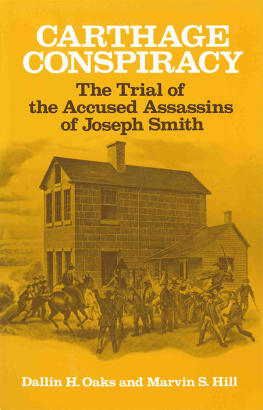
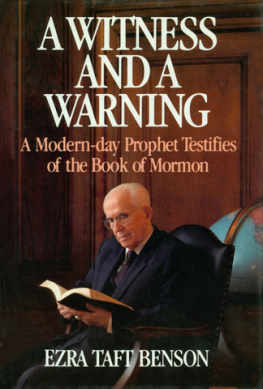
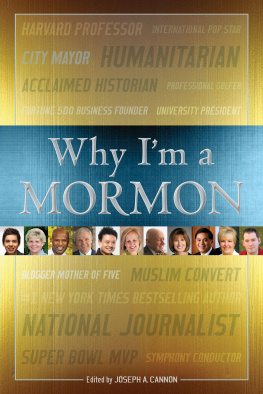
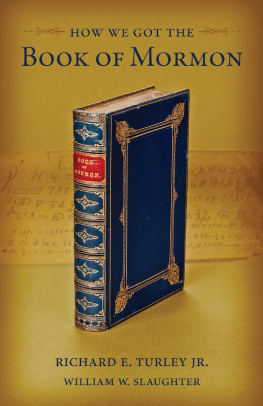
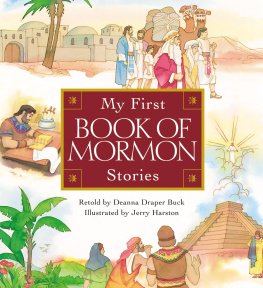


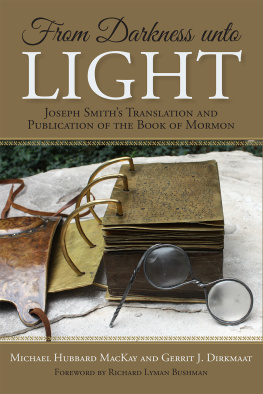
 Afterword
Afterword 